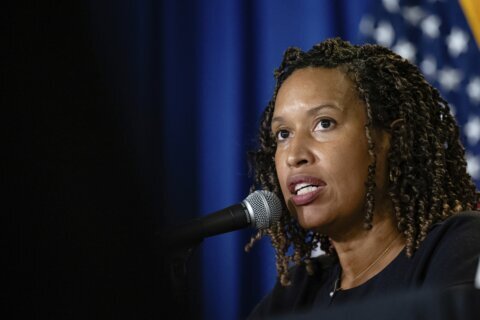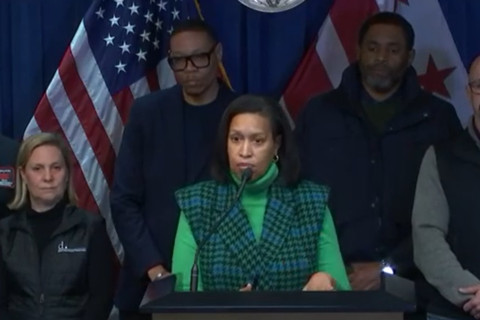D.C. leaders are grappling with the future of the city’s current plan meant to help homeless residents get off the streets — efforts which dozens of witnesses testified Tuesday have cleared many out of the encampments leaving them nowhere to go.
Deputy Mayor for Health and Human Services Wayne Turnage testified that homeless encampments across the city have grown by 40% over the last year. He applauded Mayor Muriel Bowser’s Coordinated Assistance and Resources for Encampments pilot program, or CARE, which aims to provide eligible residents with vouchers for temporary housing while clearing parks of homeless encampments that Turnage said are dangerous.
“DHS under the mayor’s guidance has worked exceptionally hard to slow the rate at which people are entering the city’s homeless system. But despite these efforts, residents continue to flow into this system at a higher rate than they have and the pandemic exacerbated … this imbalance because we had to reduce shelter capacity to allow for more social distancing,” Turnage said during his testimony Tuesday.
Turnage estimated about 300 people in the city are homeless, which he attributed in part to the pandemic.
“No one has been ticketed, or arrested, or evicted from an encampment,” Turnage said.
But Council member Brianne Nadeau, who represents Ward 1, later said his statement was “not true.”
Council members heard divisive testimony for more than seven hours before Turnage offered the government’s perspective about how the city’s CARE Program is working.
During the hearing, one advocate took her phone to an encampment at New Jersey Avenue and O street in NW and made it possible for residents, such as Jamal Thomas, 37, to testify.
“I’ve been homeless for seven years,” Thomas said. “Where are we supposed to go, a crowded bus stop? Or put a blanket on the street?”
Overwhelmingly, advocates and unhoused residents who testified said the program has been rushed and asked for the so-called evictions to stop. The majority of the 50 witnesses said they were not given a voice in crafting the CARE pilot program, which offers some residents temporary housing vouchers.
“Once I get my voucher, I’m still going to be out here sleeping on the curb or on the sidewalk because they are trying to put us out from here,” Jamal said of the O street encampment scheduled for clearing Nov. 18.
“We’re gonna try to get you connected with somebody who can try to help you out man, OK?” said Council member Vincent Gray, who was interrupted by advocate Brianna Thomas who had previously testified.
“So what you can do right now is stop the eviction,” she said. “Like, there is something that you can do. It’s a tangible action that you can take to stop the eviction that’s happening on the 18th,” she said.
Comments supporting her statement came rolling in on the chat connected to the streaming hearing.
Advocates praised the CARE program for providing some residents with temporary apartments to allow them to get on their feet, however they say that not every homeless person or family is offered housing despite being moved from their encampment. Others asked for the city to provide residents more time to acclimate to the idea of moving and not feel they are being evicted.
“It is not happening in a vacuum. The reason that there are more people in tents in New Jersey and over the last several weeks is because they closed down M Street and there’s nowhere else for people to go, because they didn’t house everybody on M street despite their promise to do so,” Anne Marie Staudenmaier with Washington Clinic for the Homeless.
Jesse Rabinowitz with Miriam’s Kitchen said the program has created fear for residents living both in and around the encampments that their situation is even more unstable, and the city has not communicated when they must leave or where they can go.
“The current implementation of the CARE pilot program has operated without transparency or oversight from the council and without input from people with lived-experience of homelessness and other experts and without guidelines or guardrails. Despite statements from four council members and over 1,800 letters sent by D.C. voters and outcry from these leading nonprofits as well as D.C. literally bulldozing somebody, this pilot has continued to grow … this is not acceptable,” Rabinowitz said.
He was referring to a previous clearing of an encampment under a Metro overpass in Northeast, D.C., during which time crew picked up a man using a front-loader injuring him while he was still in his tent.
Nadeau, the Ward 1 council member, acknowledged the “traumatic experience” that many unhoused residents have endured in being moved from their encampments and thanked nonprofits, such as Miriam’s Kitchen, for using its established relationship with unhoused residents to make them aware of the city’s programs to help find them temporary housing.
“One of the things that I’ve observed when I’m down in the encampments is that folks don’t always want to talk to government officials,” Nadeau said of the challenge in reaching the homeless community. “And it’s not surprising because, you know, when it comes to these encampment clearings, it’s the government that’s doing it, right … I’m more than happy to go down if people want to talk to me and trust me, you know, sometimes that works. But I’m not going to stand on my high horse and say, ‘It’s gotta be me,’ if there’s someone else out there that a person connects with more that I can connect with.”








